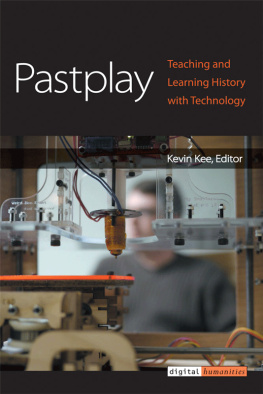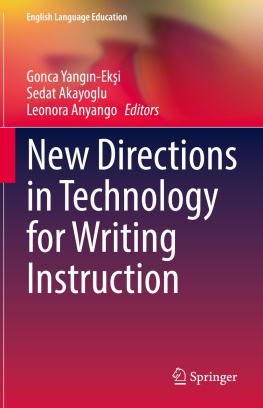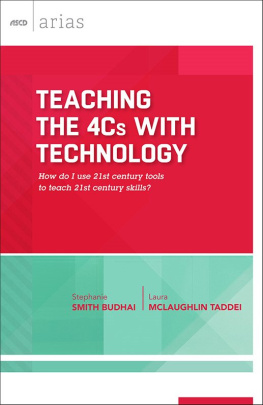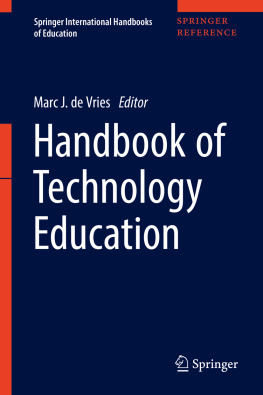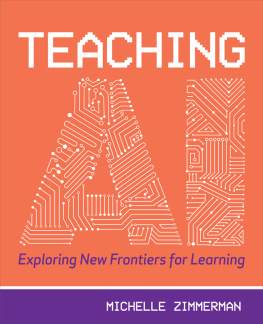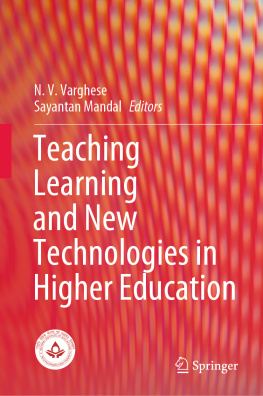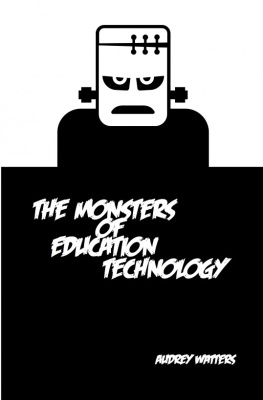Kee - Pastplay: Teaching and Learning History with Technology
Here you can read online Kee - Pastplay: Teaching and Learning History with Technology full text of the book (entire story) in english for free. Download pdf and epub, get meaning, cover and reviews about this ebook. year: 2018, publisher: The University of Michigan Press, genre: Politics. Description of the work, (preface) as well as reviews are available. Best literature library LitArk.com created for fans of good reading and offers a wide selection of genres:
Romance novel
Science fiction
Adventure
Detective
Science
History
Home and family
Prose
Art
Politics
Computer
Non-fiction
Religion
Business
Children
Humor
Choose a favorite category and find really read worthwhile books. Enjoy immersion in the world of imagination, feel the emotions of the characters or learn something new for yourself, make an fascinating discovery.
Pastplay: Teaching and Learning History with Technology: summary, description and annotation
We offer to read an annotation, description, summary or preface (depends on what the author of the book "Pastplay: Teaching and Learning History with Technology" wrote himself). If you haven't found the necessary information about the book — write in the comments, we will try to find it.
Kee: author's other books
Who wrote Pastplay: Teaching and Learning History with Technology? Find out the surname, the name of the author of the book and a list of all author's works by series.
Pastplay: Teaching and Learning History with Technology — read online for free the complete book (whole text) full work
Below is the text of the book, divided by pages. System saving the place of the last page read, allows you to conveniently read the book "Pastplay: Teaching and Learning History with Technology" online for free, without having to search again every time where you left off. Put a bookmark, and you can go to the page where you finished reading at any time.
Font size:
Interval:
Bookmark:
 Page i Page ii
Page i Page ii The Digital Humanities series provides a forum for groundbreaking and benchmark work in digital humanities, lying at the intersections of computers and the disciplines of arts and humanities, library and information science, media and communications studies, and cultural studies.
Series Editors:
Julie Thompson Klein, Wayne State University
Tara McPherson, University of Southern California
Paul Conway, University of Michigan
Teaching History in the Digital Age
T. Mills Kelly
Hacking the Academy: New Approaches to Scholarship and Teaching from Digital Humanities
Daniel J. Cohen and Tom Scheinfeldt, Editors
Writing History in the Digital Age
Jack Dougherty and Kristen Nawrotzki, Editors
Pastplay: Teaching and Learning History with Technology
Kevin Kee, Editor
DIGITALCULTUREBOOKS, an imprint of the University of Michigan Press, is dedicated to publishing work in new media studies and the emerging field of digital humanities.
Page iiiKevin Kee, Editor
The University of Michigan Press
Ann Arbor
Copyright by Kevin Kee 2014
Some rights reserved

This work is licensed under the Creative Commons Attribution-Noncommercial-No Derivative Works 3.0 United States License. To view a copy of this license, visit http://creativecommons.org/licenses/by-nc-nd/3.0/ or send a letter to Creative Commons, 171 Second Street, Suite 300, San Francisco, California, 94105, USA.
Published in the United States of America by
The University of Michigan Press
Manufactured in the United States of America Printed on acid-free paper
Printed on acid-free paper
2017 2016 2015 2014 4 3 2 1
A CIP catalog record for this book is available from the British Library.
DOI: http://dx.doi.org/10.3998/dh.12544152.0001.001
ISBN 978-0-472-11937-0 (cloth: alk paper)
ISBN 978-0-472-03595-3 (paper: alk paper)
ISBN 978-0-472-12048-2 (e-book)
This book has been published with the financial support of the Canada Research Chairs program, and the Social Sciences and Humanities Research Council of Canada Strategic Knowledge Clusters Grants program.

This volume is the second major publication of The History Education Network/Histoire et ducation en rseau (THEN/HiER).
 Page v
Page v
Ruth Sandwell and John Sutton Lutz
Stphane Lvesque
Richard Levy and Peter Dawson
Timothy Compeau and Robert MacDougall
Stephen Ramsay
Sean Gouglas, Mihaela Ilovan, Shannon Lucky, and Silvia Russell
Bethany Nowviskie Page vi
William J. Turkel and Devon Elliott
Matthew Kirschenbaum
Shawn Graham
Jeremiah McCall
Brenda Trofanenko
Kevin Kee and Shawn Graham
Patrick Dunae and John Sutton Lutz
T. Mills Kelly
Kevin Kee
Community, relationship, play. The April 2010 symposium from which this book emerged was a testament to the words with which contributor Stephen Ramsay closes his chapter. Written before we met, his maxim became the catchphrase of our meeting in Niagara-on-the-Lake, Canada. Credit for that spirit is due to the symposium participants, who became (along with their co-authors) the contributors to this volume. Thanks to Timothy Compeau, Patrick Dunae, Devon Elliott, Sean Gouglas, Shawn Graham, T. Mills Kelly, Stphane Lvesque, Richard Levy, John Sutton Lutz, Robert MacDougall, Jeremiah McCall, Bethany Nowviskie, Stephen Ramsay, Geoffrey Rockwell, Ruth Sandwell, Brenda Trofanenko, and William J. Turkel. The two days we spent together were one of the most rewarding experiences of my academic career.
I am especially indebted to William J. Turkel, who helped me conceive of the Pastplay project, and then pushed it beyond its initial scope. This book is broader and deeper as a result of his imagination and wisdom. Matthew Kirschenbaum, who was unable to attend the symposium, later added an important dimension to our collection with his chapter on history and board games. Several months after the meeting, Geoffrey Rockwell and I met to conceptualize the introduction. He was characteristically insightful and generous, and our fruitful collaboration was a fitting coda to the project.
The gifted graduate students with whom I have had the pleasure of working with played an important role from beginning to end. Tom Mitrovic helped organize the initial gathering; as the symposium drew to a close, he received the thanks he deserved. It was, he was told on several occasions, the best meeting that Ive ever attended. Nicki Darbyson, Emily Nolan, and Spencer Roberts supported the editing; and Spencer organized the index, with some playful technology and a lot of elbow grease. Thanks as well to the anonymous reviewers whose careful appraisal underscored the need for this book, and led to the improvement of its contents.
The University of Michigan Press, and specifically the digitalculturebooks imprint, was the ideal destination for our book. Many thanks to then-Editor in-Chief Thomas Dwyer, who agreed to publish Pastplay; and Editorial Assistant Christopher Dreyer, who shepherded it to completion. At BookComp, Nicholle Lutz expertly guided me through the final editorial process.
Page viiiPastplay would not have been possible without the financial support of The History Education Network/Histoire et ducation en rseau (THEN/HiER). Led by Penney Clark at the University of British Columbia, THEN/ HiER is the first pan-Canadian organization devoted to promoting and improving history teaching and learning by bringing together the multiple and varied constituencies involved in history education. Penney and my fellow THEN/HiER board members have been enthusiastic supporters of the project from the beginning, and I am honored that Pastplay is THEN/ HiERs second major publication. Along with Penney, I gratefully acknowledge the financial support of the Social Sciences and Humanities Research Council of Canada and its Strategic Knowledge Clusters Program which has funded THEN/HiER, and sub-projects such as this book. I also appreciate the support of the Canada Research Chairs program, and Brock University, both of which provided me with the time and funds to bring Pastplay to completion.
At home, Anne-Marie, Jacob, and Kathleen personify playfulness. They do not share my interest in its research, they simply make it happen. Finally this book is dedicated to the community of researchers, educators, practitioners, and students who are exploring imaginative, engaging ways to use new tools and environments to analyze and express history. I look forward to what emerges next from our sandbox.
Page 1Kevin Kee
I think youve missed your audience. The speaker was a digital humanities colleague, and an amiable guy. His intent was to broker a peace, and perhaps save me from myself. I had been invited to present to a group of scholars and graduate students. All were humanists, some historians, and all for the most part interested in digital technology. The conference had been impeccably organized, the graduate students passionate and interested, and the host a paragon of hospitality. Following dinner with the organizers the night before, I had phoned home to say that it had been one of the most enjoyable social evenings I had spent with a group of strangers. But in the minutes following my presentation, that collegiality seemed to be evaporating.
Next pageFont size:
Interval:
Bookmark:
Similar books «Pastplay: Teaching and Learning History with Technology»
Look at similar books to Pastplay: Teaching and Learning History with Technology. We have selected literature similar in name and meaning in the hope of providing readers with more options to find new, interesting, not yet read works.
Discussion, reviews of the book Pastplay: Teaching and Learning History with Technology and just readers' own opinions. Leave your comments, write what you think about the work, its meaning or the main characters. Specify what exactly you liked and what you didn't like, and why you think so.

